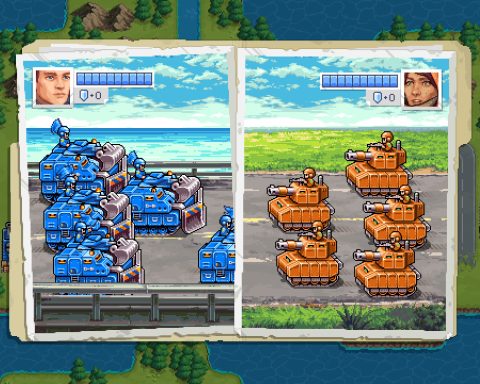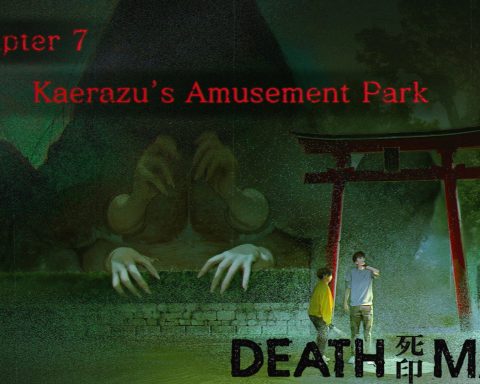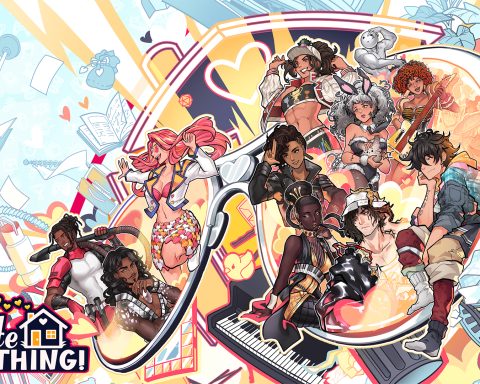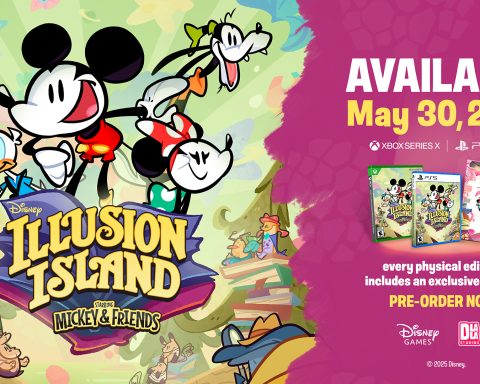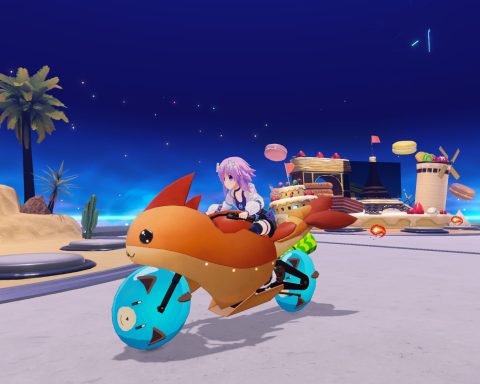 Review by Matt S.
Review by Matt S.
There is no way that Persona Q should have worked. Taking two of the most narrative-intensive and philosophically deep games ever produced in Persona 3 and 4, and then mashing them together into an Etrian Odyssey clone should have been a disaster. As good as the Etrian Odyssey games are, they are not narrative experiences. Meanwhile, if you remove the narrative from the Persona games, you’ve got something quite bland.
Making a crossover between the two shouldn’t have worked, but it did. Persona Q is brilliant.
It has a wicked sense of humour, for a start. I don’t want to give away the jokes, because that would be unfair to people before they play the game, but there’s a sequence early on where the characters are stuck in an Alice in Wonderland-themed dungeon and need to drink the famous “shrink me” potion in order to squeeze through a tiny door that made me laugh so hard I literally fell out of my bed as I was playing. The developers of Persona Q have understood at a very fundamental level that it was always going to be important to provide loads of fanservice to get people on board with this game. I don’t mean fanservice in terms of bikinis and shower scenes (though given Rise’s presence in the game I wouldn’t have exactly minded that…), but rather fanservice in understanding that the appeal of both Persona 3 and 4 was the relationships and dynamics between small groups of friends, and then playing on that for maximum effect. In recognising the fundamental silliness of the game’s concept the developers have wisely gunned for a comic experience, and absolutely nailed the tone.
With the exception of Teddy, who has for some reason been turned from an innocent but cheeky individual discovering the world for the first time into a lecherous pervert, the storytellers have managed to accurately capture the personalities of every one of the characters despite upping the comedy ante. Drawing from the entire cast of two Persona games means there are a wide range of characters to choose from, and only room for five in the adventuring party at any one time. I found myself over and over again going for strategically weak teams (mostly including Kanji) simply because the way that specific group chattered as they explored and fought enemies amused me the most (especially Kanji. That dude is hilarious).
Persona Q does lack for some of the deeper philosophical insights that are intregal to the plots of Persona 3 and 4, perhaps as a consequence of aiming for humour rather than narrative depth. But the comedy hasn’t replaced the franchise’s intelligence either. Part of the issue is that the game has removed the “social links” mechanic that was such a core focus of the main Persona games. That mechanic served an in-game purpose in the Persona games (powering characters up), but it was also a core storytelling feature, as it allowed the story writers to provide insights around the concept of identity and society.
But on the other hand, Persona Q’s various settings ask players different questions of their own. At the start of the game the characters find themselves trapped in a different dimension where the extent of the world is a high school ‘Culture Festival’ from which there is no escape. There’s meaning to that choice of setting. So, too, do each of the various dungeons have meaning… as is obvious from the very first one. From personal experience. if a game, book, or film in some way appropriates Alice in Wonderland then there’s some serious smokin…. philosophical thinking going on. I’ll leave you to puzzle through the deeper thinking behind Persona Q for yourself (or I’ll address it way down the track where I can do so without worrying about spoiling it on people reading this review to decide whether to buy the game), but the point to note here is that despite adopting the Etrian Odyssey approach to gameplay, Persona Q hasn’t lost its franchise’s heritage in storytelling, and is the better for it. I thought after the relative disappointment of Etrian Odyssey IV that I was done with the formula, but this game has reinvigorated me entirely.
The gameplay itself will be very familiar to fans of Etrian Odyssey. As with that series, you’re tasked with traversing a dungeon from a first person perspective, and fighting random encounters in a turn based fashion. This is a fairly common genre, having been around since almost the advent of video games with Wizardry, but where Etrian Odyssey and Persona Q stand out is in the mapping feature. On the 3DS’s touch screen you’re tasked with drawing the map as you wander around the dungeon. This slows the pace of exploration right down, as you are constantly scribbling down walls and dungeon features after every few steps, but the tradeoff is worth it, as these games capture something very nostalgic for fans of the likes of Wizardry from long ago: in those days you would buy yourself a book of grid paper and a pencil to map out the dungeons as you explored, because otherwise you’d become hopelessly lost very quickly.
In combat you’ll be bringing along a party of five fighters, divided into a front row (where you stick the warriors) and a back row (where the mages and archers go so the enemy attacks them less often). Each character has their own skills, weaknesses, and abilities, and you’ll need a good mix of these, because it is absolutely essential to have the right skills in the party to take advantage of the enemy’s weaknesses. Hit them with something they’re weak to, and you’ll get to go first in the next round. That might sound like a small benefit, but given the exceeding difficulty of each and every encounter, every small advantage is a cause for celebration.
Where Persona Q really differs from Etrian Odyssey is in the persona system that it borrows in a significant manner from its Persona roots. As with the ‘real’ Persona games, characters can earn monsters, or ‘personas’ through battle. A little like Pokemon there are a load of them to collect, and each of these personas gives characters additional abilities, either enhancing their existing strengths, or giving them new abilities to cover weaknesses. It’s also possible to ‘fuse’ these personas together to create even more powerful ones.
Finally, there’s a couple of support options to take into battle. Both Rise and…. well, I can’t remember. I only ever used Rise. These characters can’t fight themselves, but they offer support from the background in the form of additional skills that can only be used sparingly, but offer big benefits such as faster actions and healing that can turn the time of an especially difficult battle.
Creating a powerful party that has a good mix of characters, personas and support is a game in and of itself, and is so deep and nuanced that I doubt any two players will end up with the exact same mix of characters and personas. This structure is far more complex than what we’ve seen in Etrian Odyssey games in the past, and the game is the better for it. Persona Q is going to be an intimidating game for newcomers because of the complexity of how the various systems work together, and the completely unforgiving difficulty if you get the mix wrong, but its worth persevering with because it allows genuine strategic control and is balanced beautifully to be challenging, but ultimately, so very interesting.
At first I wasn’t especially enamoured to the visual presentation. The chibi characters are cute enough, but I loved the visual design of Persona 4 (and to a lesser extent Persona 3), with its more traditional anime presentation and simple, elegant character models. Especially Rise. But as I played Persona Q, the style did grow on me. It certainly suits the more lighthearted and comedic narrative, and the dungeons themselves are nothing short of breathtaking in design. The visual aesthetic is also perfectly complemented by a soundtrack that is the same brilliant mix of pop Jazz and JPop as the Persona games. And so I’ve come around; Persona Q does fit in with the franchise, despite the different approach to character design.
The only issue I have with the game isn’t even an issue for me: to enjoy Persona Q to its full extent it is absolutely, 100 per cent essential that you’ve played both Persona 3 and 4. There is an absolute load of assumed knowledge at play in this game, with a lot of the plot and humour referring directly to events from both games, and without that background knowledge, the characters, humour, and nuances of the plot will fall flat. In that context it’s a little surprising that this game was developed for a release on the Nintendo 3DS, when no Persona games have ever appeared on a Nintendo console, rather than the PlayStation Vita, which has versions of both Persona 3 and 4 currently available on it. Surely it would have made more sense to release the game on the console where people can get up to speed before starting?
On the other hand, it’s worth investing in a Vita or PlayStation 3 to play Persona 3 and 4 if you haven’t already anyway, because they’re two of the finest games ever produced. When I reviewed Persona 4 Golden on the PlayStation Vita, I made the mistake of not giving it a 5-star score. I don’t even remember why I did that. I regret it, because it is a 5-star game.
And so is Persona Q.
– Matt S.
Editor-in-Chief
Find me on Twitter: @digitallydownld







